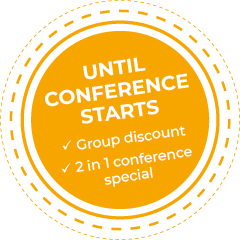Speaker
Infos
09:00 - 17:00
Description
Extracting knowledge from text data has always been one of the most researched topics in machine learning, but only recently have we witnessed breakthroughs that put NLP in the spotlight. Much information is stored in unstructured data, like text, which is extremely important in many different fields, from finance to social media and e-commerce.
In this course, we will go through Natural Language Processing fundamentals, such as pre-processing techniques, embedding, and more. It will be followed by practical coding examples, in python, to teach how to apply the theory to real use cases.
The goal of this workshop is to provide the attendees all the basic tools and knowledge they need to solve real problems and understand the most recent and advanced NLP topics.
Content & Process
Lesson 1 Text Representation
Theory: Familiarize yourself with NLP fundamentals and text preprocessing, to prepare the data for our models. We will go rthrought the main steps like removing stopwords, stemming, One-Hot Encoding, and more.
Exercise: Apply text preprocessing methods on a simple dataset.
Outcome: You will be able to apply to appropriate methodology to preprocess the text.
Lesson 2 Topic Modeling
Theory: We will see what LDA is and how it can help extract information from documents. We will also try different clustering techniques and implement a Non-negative Matrix factorization.
Exercise: Apply topic modelling techniques on a simple text.
Outcome: You will be able to apply to extract the main information from documents using topic modelling techniques.
Lesson 3 Text classification
Theory: We will learn how it’s possible to represent text and how a classifier can use this representation. We will use TF-Idf and experiment with a couple of supervised learning models.
Exercise: Build an NLP pipeline to perform classification.
Outcome: You will be able to solve a text classification problem end to end.
Lesson 4 Introduction to Deep Learning in NLP
Theory: Understand word embedding, how it works and how to use it. We will go through the main concepts behind word embedding and see some practical examples using the Gensim library.
Exercise: Leveraging python deep learning libraries to create an NLP pipeline for sentiment analysis.
Outcome: You will be able to use word embedding to perform any text classification task.
Lesson 5 Sequential Models
We will quickly introduce the most recent development of Deep learning in NLP, in particular we will see how to leverage BERT and ELMo and their pre-trained models to solve NLP problems.
Outcome: you will be able to understand the theory behind Sequential models and apply it to practical problems.
Lesson 6 Generative models
In this part we will see some technique to generate and summarize text. We will explore methods like Variational AutoEncoders (VAE) and Generative Adversarial Networks (GAN) and of course the most famous of them all, the GPT models from OpenAI. We will also see how to generate text using python.
Outcome: You will have a good understanding of generative models and how to use them to generate text in python.
Audience & Requirements
This course is designed for data scientists, data analysts and software engineers who want to start working with NLP without treating it like a black box. They want to have an understanding of the theory but most importantly how to approach a real problem.
We will be using python in all exercises therefore some python knowledge is required. Some machine learning knowledge is beneficial but not required.
What will attendees learn during the training?
● Understand NLP basics
● Create an NLP pipeline to preprocess the data using python
● Perform topic modelling
● Use python libraries for NLP tasks, in particular, NLTK, Gensim and Glove
● Leverage transfer learning and text embeddings to perform NLP classification



